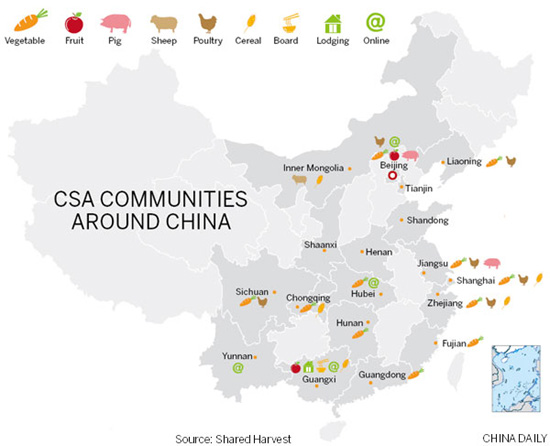
 |
No tomatoes in winter. No oolong tea after Tomb Sweeping Day. Do not treat meat as an everyday staple. The initial impression is that she keeps to the stringent regime of a sustainable lifestyle, but Shi Yan says it's all totally natural - if you live on a farm.
She is probably the best-known advocate of community-supported agriculture in this country, and she is totally committed.
"If you live and feed on the farm, you have more vegetables and grains. And you can only kill a pig once in a while. It cuts down the consumption of meat."
As for the tea, she says oolong tea before Qingming (Tomb Sweeping Day) is better because pesticides are rarely necessary then.
"Whatever nature dictates, it's often the best," the 30-year-old post-doctorate graduates says. She calls herself a "new farmer" and has been preaching the cause for many years in her slow, calm, measured tones.
Shi is on the sustainability lecture circuit, often appearing in a simple linen shift with her hair tied up in a ponytail and wearing sandals that had just trudged through the farm fields. She has been doing this since she came back from six months' of hard labor on the Earthrise Farm in Minnesota in 2008.
"Once you build up an intimate relation with the land, life is different," says the city-bred agriculture scientist from Baoding, Hebei province. It was the hands-on experience from dawn to dusk that taught her the CSA concept from the ground. She wrote a book on her return and quickly became a champion of the movement.
Her first project, initiated with her heavyweight graduate program supervisor Wen Tiejun from Renmin University of China, is Dondon Farm in western Beijing. It made its name as a rented plot of land that hires farmers and promises clean, natural produce for customers who order and pay in advance.
It was a success, although the founder says with all modesty "it was because we broke the ground at the right moment, when concern for food safety was extremely high."
The farm is still thriving after three years but Shi wanted to address the bigger issue - the sustainability of the rural community "where we are determined to live".

















 Migrant workes' high incomes not that rosy
Migrant workes' high incomes not that rosy


![]()
